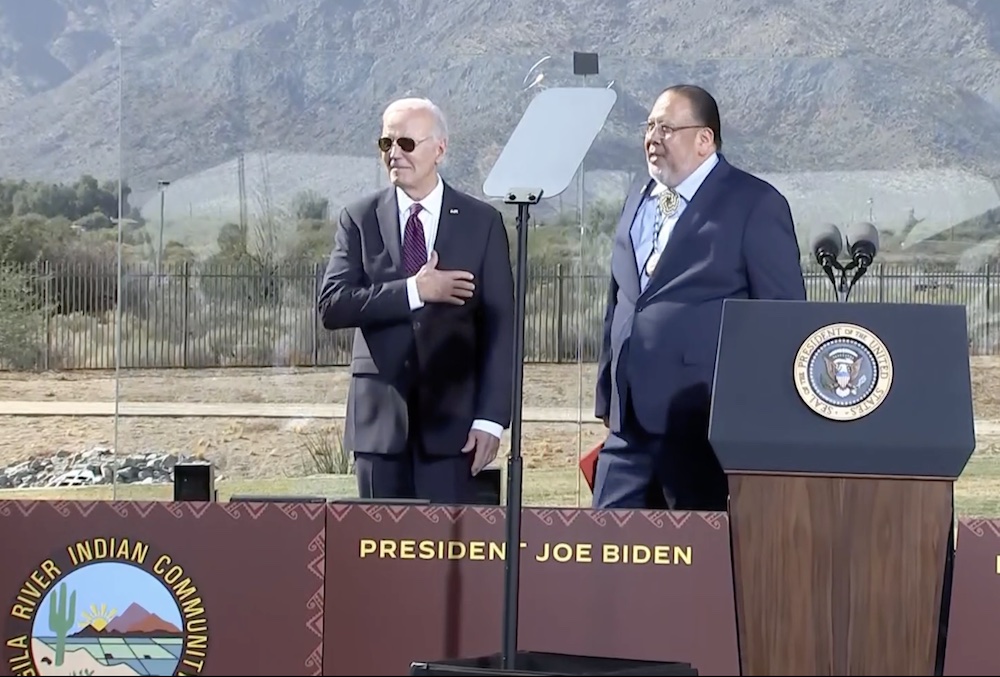
- Details
- By Brian Edwards
- Sovereignty
President Joe Biden is visiting the Gila River Indian Community today bearing significant economic wins for Indian Country – and carrying the weight of a long-awaited apology for one of the darkest chapters in U.S. history.
The visit — Biden's first to a tribal reservation as president — showcased dramatic increases in federal spending with Native-owned businesses during his term: federal contract dollars jumped by $8.2 billion between fiscal years 2020 and 2023. But it also marks the first time a sitting president has formally apologized for the federal Indian boarding school system that forcibly removed Native children from their homes for more than 150 years.
Biden, who learned early in his Senate career from Hawaii Senator Daniel Inouye to say “Indian nations” rather than “Indian Country,” has focused on transforming relationships as much as delivering resources.
The economic numbers are substantial: $32 billion from the American Rescue Plan marks the largest direct federal investment in tribal nations in history. Another $13 billion flows through the Bipartisan Infrastructure Law for broadband, roads, and water systems. The Inflation Reduction Act adds $700 million for climate resilience and clean energy development.
But for Biden, who has spent time in Indian Country as senator, vice president and now president, the investments serve a deeper purpose — fulfilling what he calls “solemn trust and treaty obligations that we haven't always lived up to.”
The commitment shows in his administration's approach to economic development. The Small Business Administration has doubled lending to Native American businesses. The Buy Indian Act has been reinvigorated, directing billions in federal contracts to Native enterprises. The first-ever advance appropriations for Indian Health Service marked another key victory that will allow tribal hospitals to “plan ahead, order supplies, hire doctors, and know that the money will be there,” Biden said today during his visit.
Beyond economics, Biden has emphasized what he calls “respect” — for tribes as nations, for treaties as law, and for Indigenous knowledge in federal decision-making. His administration has signed more than 200 co-stewardship agreements giving tribes greater control over federal lands and waters management. Biden's commitment to transforming federal-tribal relations extends to personnel — his administration has appointed more than 80 Native Americans to key positions, including Deb Haaland (Laguna Pueblo) as the first Native American cabinet Secretary and lifetime Chief Lynn Malerba (Mohegan Tribe) as the first Native American Treasurer.
During today's visit, Gila River Indian Community Governor Stephen Roe Lewis emphasized the transformation. “The most important thing that all of these historic investments in Indian Country share in common is this President's commitment to honoring tribal sovereignty, to treating tribes as nations, to carrying out the treaty and trust responsibility, not just in words, but by his actions,” Lewis said. “He walks these words every day.”
The boarding school apology reflects Biden’s broader transformation. The federal government spent more than $23.3 billion in today's dollars on the boarding school system between 1871 and 1969, according to Interior Department investigations. At least 973 children died at these schools, which systematically worked to destroy Native languages and cultures.
“No apology can or will make up for what was lost during the darkness of the federal boarding school policy, but today we’re finally moving forward into the light,” Biden said during his remarks this afternoon.
The willingness to confront this painful chapter signals just how much federal-tribal relationships have evolved under Biden. His Gila River visit is highlighting how funding and policy changes have transformed federal-tribal relations. Beyond the numbers, his emphasis on cultural respect, nation-to-nation partnerships, and acknowledging historical wrongs marks a fundamental shift in how Washington engages with tribal nations. While Indian Country remains divided on some of his administration's decisions, he's set a new bar for nation-to-nation relationships between the U.S. government and sovereign tribal nations.
In case you haven't heard, Biden isn't running for re-election. Let's hope that the next occupant of the Oval Office — regardless of party — will build on the growing bipartisan recognition that strengthening tribal sovereignty and honoring trust obligations transcends partisan politics. After all, progress in federal-tribal relations shouldn't depend on which party controls the White House.
Editor's Note: This has been updated with a photo and remarks made during today's event by Gila River Indian Community Governor Stephen Roe Lewis and President Joe Biden.
